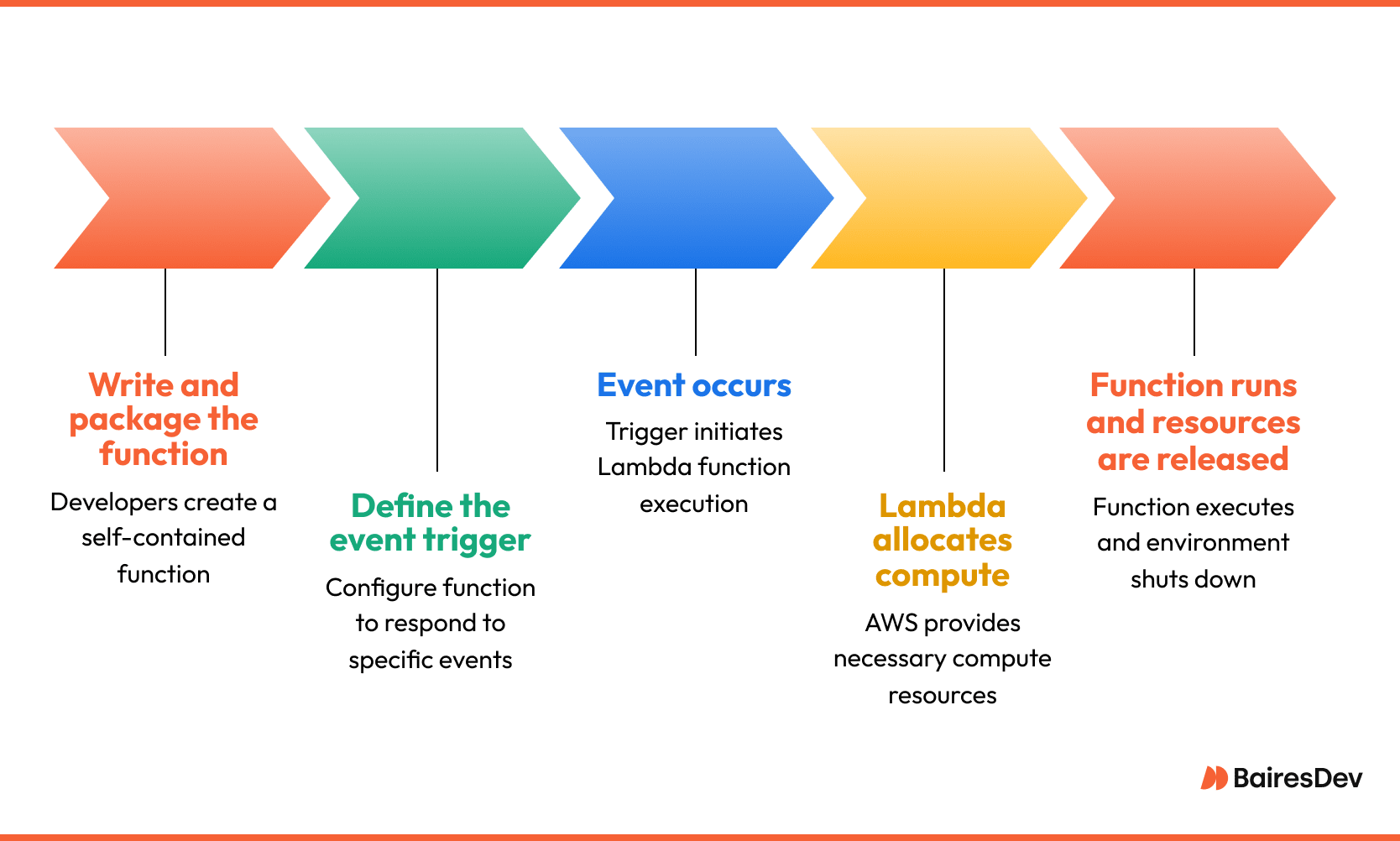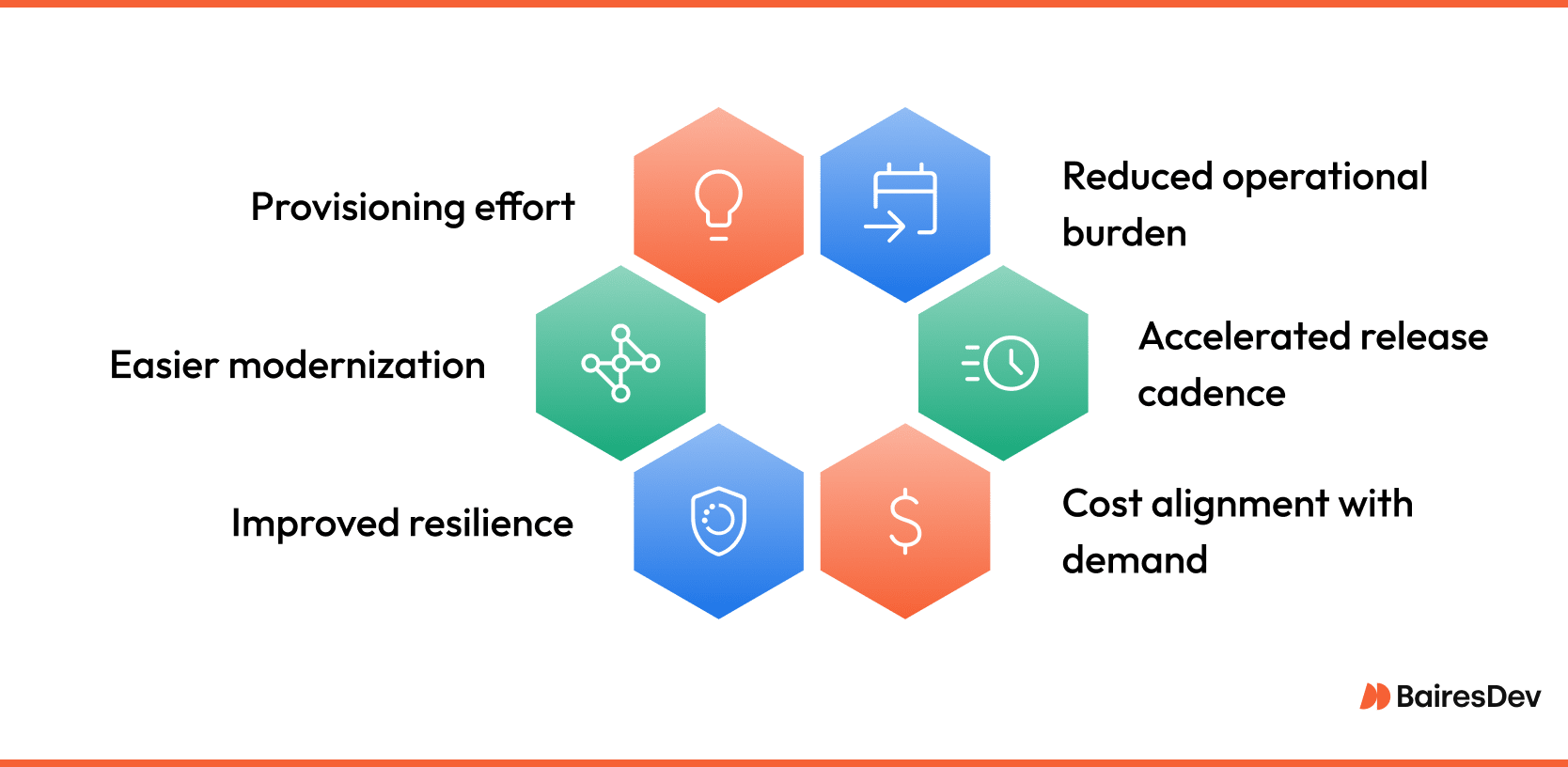Let’s demystify AWS Lambda, Amazon’s flagship serverless computing service. Why is it becoming a strategic lever for technology leaders who need to keep products moving while controlling operational risk and cost? We will stay clear of deep architectural jargon, but by the end of this article, you should understand exactly what Lambda does, how it differs from traditional infrastructure, and where it can add tangible value to an engineering roadmap.
A Fresh Look at the “Serverless” Promise
In any modern application stack, code still has to run on physical machines: silicon, power, cooling, the works. What serverless architecture really means is that those responsibilities are handed off to the cloud provider, freeing engineering teams to focus on product logic. AWS Lambda is Amazon’s most mature realization of that idea.

Instead of provisioning instances or containers, we upload discrete functions, think self-contained pieces of business logic, package them as a ZIP file or container image, and define an event that should trigger execution. That event might be a file landing in S3, a message on an SQS queue, a call through API Gateway, or a time-based rule that fires every ten minutes. The moment the event occurs, Lambda allocates just enough compute to run the function, executes it, then releases the resources. We pay only for the milliseconds consumed, not for idle capacity.
Why does this matter?
In practical terms, it collapses the lead time between “idea” and “running code.” When a product manager requests a quick proof-of-concept endpoint, the team no longer waits for a VM request to clear a ticket queue. They write the function, push it to Lambda, and and run code without provisioning, often in under an hour. That acceleration compounds across multiple teams and iterations, translating directly into faster feature velocity and shorter feedback loops.
Cost Transparency That Finance Actually Understands
Traditional compute pricing can feel like metering by crystal ball. Teams size an EC2 fleet for peak traffic, add headroom, then pay for 100 percent of that allocation, whether it sits idle or not.
Lambda, in contrast, meters in gigabyte-seconds: memory requested multiplied by runtime length, billed to the millisecond after the first 100 ms. For unpredictable or spiky workloads such image processing, IoT telemetry bursts, overnight data clean-ups, this model often reduces spend by an order of magnitude.
Equally important, it produces bills that map directly to business events. If marketing runs a big campaign and traffic doubles, the resulting Lambda cost line rises in tandem. Finance sees a clear cause-and-effect relationship instead of a fixed monthly instance pool.
Performance Without the Midnight Pager Duty
Two words every engineering leader dreads: “capacity incident.”
Many engineers have lost weekends chasing a slow-bleeding memory leak or an instance group that failed to autoscale under load. Lambda’s operational contract removes that burden. Amazon handles multi-AZ replication, automatic scaling, and infrastructure patching.
Cold starts, the brief delay when a new execution environment spins up, still require consideration, particularly for latency-sensitive APIs, but tools such as Provisioned Concurrency let teams pre-warm functions at predictable cost. The net result is fewer busy weekends and more time spent on roadmap priorities.
When to Use AWS Lambda (and When it Doesn’t Make Sense)
Lambda offers a lot of advantages, but it’s not ideal for every team and every application.. Long-running video transcoding, heavy machine-learning training jobs, or legacy monoliths that expect persistent local storage are generally a poor fit.
However, it excels in several common scenarios:
- Event-Driven Microservices – Decouple large systems into lightweight functions that react to discrete domain events, improving maintainability and release cadence.
- Real-Time File Processing – Automatically resize images, transcode media, or sanitize documents as they enter an S3 bucket—no queue management required.
- API Back Ends – Build endpoints that scale from zero to thousands of requests per second without manual tuning, ideal for unpredictable consumer traffic.
- Automation & Scheduled Tasks – Replace cron jobs and EC2 maintenance scripts with functions triggered on a schedule, reducing patching overhead.
When we evaluate a workload for Lambda, we ask three questions: Is execution time relatively short (under 15 minutes)? Can the logic run statelessly? Does the traffic pattern fluctuate? If the answer is “yes” to all three, Lambda is usually the most efficient choice.
Bringing It Back to Business Impact
For leaders accountable to both uptime and margin, Lambda offers a rare combination: accelerated delivery, fine-grained cost control, and a lighter operational footprint. It allows high-performing teams to iterate quickly without leaving a trail of underutilized servers behind them.
That is why organizations from fintech start-ups to Fortune 100 retailers are folding Lambda into their core platforms. It lets engineers spend less time provisioning or managing servers and more time delivering the features that move the needle for clients, exactly where top-tier talent should be focused, and where leadership likes to see progress.
Comparing AWS Lambda and Amazon EC2
Amazon EC2, Elastic Compute Cloud, offers virtual machines that teams configure and operate. Engineers decide CPU allocation, memory size, networking, operating system, and scaling policies. All patching, monitoring, and fault-tolerance logic remains under direct control. This model provides maximum flexibility and is well suited to large monolithic applications, stateful services, and workloads that need sustained compute over long periods.
AWS Lambda follows a different philosophy.
Code is packaged as a function, an event source is declared, and AWS manages every other consideration. Capacity provisioning, operating system updates, multi-Availability Zone replication, and automatic scaling all become platform responsibilities.
The function can run for up to fifteen minutes, operates without local state, and is billed only for the exact milliseconds consumed. The service is designed for short-lived, event-driven tasks such as API endpoints, data transformations, or workflow orchestration steps.

A simple rule of thumb helps with workload placement. If the code is stateless, needs burst capacity, and finishes quickly, Lambda is usually preferable. If the service holds connection state, performs continuous processing, or demands specialized hardware, EC2 is probably the better choice.
Key Features of AWS Lambda
Lambda focuses on lightweight, event-driven execution with zero provisioning requirements. Teams exploring serverless solutions have to understand the specific capabilities that make Lambda uniquely suited for distributed applications.
AWS Lambda includes a set of purpose-built features designed to support scalable, secure, and highly responsive workloads.
Automatic scaling
Lambda instantly responds to workload changes by creating execution environments as needed. Whether a single request arrives or thousands arrive in the same second, compute resources grow and contract without manual intervention.
Provisioned concurrency
For latency-sensitive services, provisioned concurrency keeps a chosen number of execution environments warm and ready. This feature delivers predictable response times while still avoiding the overhead of managing servers.
Broad language support
Lambda natively supports popular programming languages such as Node.js, Python, Java, Go, Ruby, .NET, and PowerShell. Custom runtimes extend compatibility to any additional language that can compile for Linux, including C++, Rust, or Swift.
Container image packaging
Functions may be deployed as OCI-compatible container images up to ten gigabytes. Teams can standardize on existing build pipelines and include operating-system libraries, machine-learning models, or other large dependencies.
Deep service integration
More than two hundred AWS and SaaS services can emit events that trigger Lambda functions. Common pairings include Amazon S3 for object processing, Amazon DynamoDB Streams for change data capture, Amazon EventBridge for business events, and Amazon Cognito for user lifecycle hooks.
Fine-grained security controls
Each function executes with an AWS Identity and Access Management role that grants the least privileges required. Network placement within a VPC, encryption of environment variables, and AWS Key Management Service integration provide additional defense layers.
Execution environment
Lambda creates a fresh sandbox for each invocation. After execution, the environment is reclaimed, ensuring clean state and efficient resource utilization. Re-used environments cache package imports to accelerate subsequent runs while preserving isolation.
Benefits of Adopting AWS Lambda

AWS Lambda reduces the need for teams to manage infrastructure directly. There are no servers to provision, no operating systems to patch, and no scaling logic to build. The platform takes care of these responsibilities automatically. This frees up engineering resources and shortens the time between an idea and its delivery.
Speed is another key advantage. A Lambda function can be deployed quickly, using existing pipelines and familiar tooling. Because each function is separate from the rest of the system, teams can release updates without coordinating large-scale changes. Smaller code units also mean simpler testing and easier rollbacks.
The cost model is aligned with actual usage. Instead of paying for idle servers, organizations pay only for the time their functions are actively running. For workloads that are event-driven or inconsistent in volume, this often results in lower cloud bills. It also makes spending easier to predict and tie back to specific applications or business processes.
Reliability is built in. Lambda functions are executed across multiple Availability Zones. The platform automatically retries when needed and scales based on demand. This helps systems stay responsive during peak usage or when parts of the infrastructure are under pressure.
For teams working with legacy applications, Lambda can offer a more practical path to modernization. Rather than rewriting everything at once, it’s possible to extract individual tasks—like file conversions or background processing—and move them to Lambda. This approach reduces risk and helps spread the work across multiple releases.
Finally, the architecture encourages experimentation. A new feature can be implemented as a standalone function, tested in isolation, and deployed without changes to the broader system. This lowers the barrier to innovation and allows teams to learn quickly without creating unnecessary complexity.
AWS Lambda Pricing
The pricing model for AWS Lambda is simple on the surface but offers enough flexibility to support both small projects and large-scale systems. It is based on two main factors: the number of function invocations and the amount of computing power used during those invocations.
Each time a Lambda function runs, it counts as a request. For most workloads, especially those with unpredictable or uneven traffic, this pay-per-request model helps avoid waste. There is no need to keep servers running in the background just in case traffic spikes. You’re only billed when your code actually runs.
Compute time is measured in gigabyte-seconds, which takes into account how long your code runs and how much memory it uses while running. AWS includes a free tier that offers 1 million requests and 400,000 GB-seconds of compute time each month. For teams experimenting with new services or handling low-volume tasks, that may be enough to run entire workloads without a bill.
Once you move past the free tier, the cost remains predictable. Each million requests is priced at $0.20. For compute time, the rate is just over one one-hundred-thousandth of a dollar per GB-second. It’s a model that scales smoothly with actual usage and offers visibility into where cloud costs are coming from.
For systems that require faster response times, such as Lambda APIs that need consistent performance under load, Lambda supports provisioned concurrency. This feature allows teams to keep functions warm and ready to execute without delay. Pricing for provisioned concurrency is based on how many instances are kept active and how long they stay running.
What makes this model appealing to many engineering leaders is how directly it maps to real system behavior. Billing is not based on estimated traffic or reserved capacity but on actual work being done. This makes it easier to attribute costs to specific services, features, or even customer segments, helping both engineering and finance teams stay aligned.
Companies That Use AWS Lambda
The list of companies that use AWS Lambda is just as impressive as the company that serves it up. The companies include Thomson Reuters, iRobot, Autodesk, Financial Engines, MLBAM, Square Enix, The Guardian, Benchling, T Mobile, Bustle, Alt/S, The Seattle Times, AOL, and Netflix.
Conclusion
AWS Lambda and Amazon EC2 both remain essential building blocks. Choosing between them involves balancing control, execution duration, and operational overhead. When the workload fits Lambda’s event-driven model, the service delivers compelling advantages in agility, resilience, and cost efficiency while allowing teams to invest their energy where it creates the most value.
Frequently Asked Questions
When does it actually make sense to use Lambda instead of a container or EC2 instance?
Lambda is a strong choice when the workload is short-lived, stateless, and event-driven. Think API endpoints, background jobs, or anything that doesn’t need to run continuously. If your service needs to run 24/7, hold state, or rely on specific hardware, you’re likely better off with containers or EC2. It’s less about one being better than the other, and more about picking the right tool for the shape of the work.
How does Lambda handle sudden traffic spikes or burst workloads?
Scaling is built in. Lambda supports individual events in parallel, across thousands of requests per second, without pre-planning. There’s no need to tweak scaling thresholds or guess at max capacity. For most use cases, it just works. That said, if your team needs predictable startup latency under heavy load, Provisioned Concurrency can keep functions warm and ready.
What’s the operational overhead like once we start using Lambda at scale?
It’s minimal compared to traditional infrastructure, but it’s not zero. You still need solid observability and good hygiene around permission scopes, error handling, and cold start mitigation. But you won’t be dealing with patching, AMIs, or scaling groups. That’s a net gain for most teams trying to move faster without growing their ops footprint.
Can our existing engineers ramp up on Lambda quickly?
In most cases, yes. If your team already writes Python, Node.js, Java, or .NET, the transition is straightforward. The bigger adjustment is architectural. Developers used to long-running apps might need to rethink how they manage state, timeouts, or coordination between services. But the tools, documentation, and community support make the learning curve manageable.
How secure is Lambda for enterprise workloads?
Lambda follows the same security model as other AWS services. Each function can run in a VPC, with its own IAM role and fine-grained permissions. You get encryption at rest and in transit, and integration with AWS KMS for sensitive data. The isolation model is strong, and because functions are ephemeral, there’s less surface area for long-term compromise.
What kind of cost visibility will finance teams get?
Better than most compute services. Since Lambda bills down to the millisecond and is tied to specific functions and event triggers, it’s easier to connect cost to business activity. You can see which feature or team is driving spend. And because you’re not paying for idle capacity, usage-based forecasting becomes more precise.
How do AWS Lambda functions fit into our existing observability strategy?
AWS Lambda functions integrate well with modern observability stacks, but they require a slightly different approach. Since functions are short-lived and event-driven, traditional host-based monitoring doesn’t apply. Instead, monitoring Lambda functions involves capturing metrics like invocation count, duration, error rates, and throttling, often through AWS CloudWatch. Logs are automatically collected, and tools like AWS X-Ray or third-party APM platforms can provide deeper visibility.







